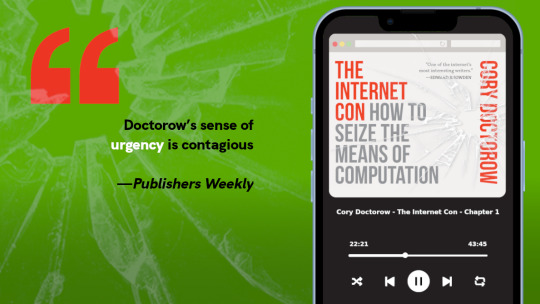#debt
Text
The tax sharks are back and they’re coming for your home

I'm touring my new, nationally bestselling novel The Bezzle! Catch me TODAY (Apr 27) in MARIN COUNTY, then Winnipeg (May 2), Calgary (May 3), Vancouver (May 4), and beyond!

One of my weirder and more rewarding hobbies is collecting definitions of "conservativism," and one of the jewels of that collection comes from Corey Robin's must-read book The Reactionary Mind:
https://en.wikipedia.org/wiki/The_Reactionary_Mind
Robin's definition of conservativism has enormous explanatory power and I'm always finding fresh ways in which it clarifies my understand of events in the world: a conservative is someone who believes that a minority of people were born to rule, and that everyone else was born to follow their rules, and that the world is in harmony when the born rulers are in charge.
This definition unifies the otherwise very odd grab-bag of ideologies that we identify with conservativism: a Christian Dominionist believes in the rule of Christians over others; a "men's rights advocate" thinks men should rule over women; a US imperialist thinks America should rule over the world; a white nationalist thinks white people should rule over racialized people; a libertarian believes in bosses dominating workers and a Hindu nationalist believes in Hindu domination over Muslims.
These people all disagree about who should be in charge, but they all agree that some people are ordained to rule, and that any "artificial" attempt to overturn the "natural" order throws society into chaos. This is the entire basis of the panic over DEI, and the brainless reflex to blame the Francis Scott Key bridge disaster on the possibility that someone had been unjustly promoted to ship's captain due to their membership in a disfavored racial group or gender.
This definition is also useful because it cleanly cleaves progressives from conservatives. If conservatives think there's a natural order in which the few dominate the many, progressivism is a belief in pluralism and inclusion, the idea that disparate perspectives and experiences all have something to contribute to society. Progressives see a world in which only a small number of people rise to public life, rarified professions, and cultural prominence and assume that this is terrible waste of the talents and contributions of people whose accidents of birth keep them from participating in the same way.
This is why progressives are committed to class mobility, broad access to education, and active programs to bring traditionally underrepresented groups into arenas that once excluded them. The "some are born to rule, and most to be ruled over" conservative credo rejects this as not just wrong, but dangerous, the kind of thing that leads to bridges being demolished by cargo ships.
The progressive reforms from the New Deal until the Reagan revolution were a series of efforts to broaden participation in every part of society by successively broader groups of people. A movement that started with inclusive housing and education for white men and votes for white women grew to encompass universal suffrage, racial struggles for equality, workplace protections for a widening group of people, rights for people with disabilities, truth and reconciliation with indigenous people and so on.
The conservative project of the past 40 years has been to reverse this: to return the great majority of us to the status of desperate, forelock-tugging plebs who know our places. Hence the return of child labor, the tradwife movement, and of course the attacks on labor unions and voting rights:
https://pluralistic.net/2022/11/06/the-end-of-the-road-to-serfdom/
Arguably the most potent symbol of this struggle is the fight over homes. The New Deal offered (some) working people a twofold path to prosperity: subsidized home-ownership and strong labor protections. This insulated (mostly white) workers from the two most potent threats to working peoples' lives and wellbeing: the cruel boss and the greedy landlord.
But the neoliberal era dispensed with labor rights, leaving the descendants of those lucky workers with just one tool for securing their American dream: home-ownership. As wages stagnated, your home – so essential to your ability to simply live – became your most important asset first, and a home second. So long as property values rose – and property taxes didn't – your home could be the backstop for debt-fueled consumption that filled the gap left by stagnating wages. Liquidating your family home might someday provide for your retirement, your kids' college loans and your emergency medical bills.
For conservatives who want to restore Gilded Age class rule, this was a very canny move. It pitted lucky workers with homes against their unlucky brethren – the more housing supply there was, the less your house was worth. The more protections tenants had, the less your house was worth. The more equitably municipal services (like schools) were distributed, the less your house was worth:
https://pluralistic.net/2021/06/06/the-rents-too-damned-high/
And now that the long game is over, they're coming for your house. It started with the foreclosure epidemic after the 2008 financial crisis, first under GW Bush, but then in earnest under Obama, who accepted the advice of his Treasury Secretary Timothy Geithner, who insisted that homeowners should be liquidated to "foam the runways" for the crashing banks:
https://pluralistic.net/2023/03/06/personnel-are-policy/#janice-eberly
Then there are scams like "We Buy Ugly Houses," a nationwide mass-fraud outfit that steals houses out from under elderly, vulnerable and desperate people:
https://pluralistic.net/2023/05/11/ugly-houses-ugly-truth/#homevestor
The more we lose our houses, the more single-family homes Wall Street gets to snap up and convert into slum properties, aslosh with a toxic stew of black mold, junk fees and eviction threats:
https://pluralistic.net/2022/02/08/wall-street-landlords/#the-new-slumlords
Now there's a new way for finance barons the steal our houses out from under us – or rather, a very old way that had lain dormant since the last time child labor was legal – "tax lien investing."
Across the country, counties and cities have programs that allow investment funds to buy up overdue tax-bills from homeowners in financial hardship. These "investors" are entitled to be paid the missing property taxes, and if the homeowner can't afford to make that payment, the "investor" gets to kick them out of their homes and take possession of them, for a tiny fraction of their value.
As Andrew Kahrl writes for The American Prospect, tax lien investing was common in the 19th century, until the fundamental ugliness of the business made it unattractive even to the robber barons of the day:
https://prospect.org/economy/2024-04-26-investing-in-distress-tax-liens/
The "tax sharks" of Chicago and New York were deemed "too merciless" by their peers. One exec who got out of the business compared it to "picking pennies off a dead man’s eyes." The very idea of outsourcing municipal tax collection to merciless debt-hounds fell aroused public ire.
Today – as the conservative project to restore the "natural" order of the ruled and the ruled-over builds momentum – tax lien investing is attracting some of America's most rapacious investors – and they're making a killing. In Chicago, Alden Capital just spent a measly $1.75m to acquire the tax liens on 600 family homes in Cook County. They now get to charge escalating fees and penalties and usurious interest to those unlucky homeowners. Any homeowner that can't pay loses their home.
The first targets for tax-lien investing are the people who were the last people to benefit from the New Deal and its successors: Black and Latino families, elderly and disabled people and others who got the smallest share of America's experiment in shared prosperity are the first to lose the small slice of the American dream that they were grudgingly given.
This is the very definition of "structural racism." Redlining meant that families of color were shut out of the federal loan guarantees that benefited white workers. Rather than building intergenerational wealth, these families were forced to rent (building some other family's intergenerational wealth), and had a harder time saving for downpayments. That meant that they went into homeownership with "nontraditional" or "nonconforming" mortgages with higher interest rates and penalties, which made them more vulnerable to economic volatility, and thus more likely to fall behind on their taxes. Now that they're delinquent on their property taxes, they're in hock to a private equity fund that's charging them even more to live in their family home, and the second they fail to pay, they'll be evicted, rendered homeless and dispossessed of all the equity they built in their (former) home.
It's very on-brand for Alden Capital to be destroying the lives of Chicagoans. Alden is most notorious for buying up and destroying America's most beloved newspapers. It was Alden who bought up the Chicago Tribune, gutted its workforce, sold off its iconic downtown tower, and moved its few remaining reporters to an outer suburban, windowless brick building "the size of a Chipotle":
https://pluralistic.net/2021/10/16/sociopathic-monsters/#all-the-news-thats-fit-to-print
Before the ghastly hotel baroness Leona Helmsley went to prison for tax evasion, she famously said, "We don't pay taxes; only the little people pay taxes." Helmsley wasn't wrong – she was just a little ahead of schedule. As Propublica's IRS Files taught us, America's 400 richest people pay less tax than you do:
https://pluralistic.net/2022/04/13/for-the-little-people/#leona-helmsley-2022
When billionaires don't pay their taxes, they get to buy sports franchises. When poor people don't pay their taxes, billionaires get to steal their houses after paying the local government an insultingly small amount of money.
It's all going according to plan. We weren't meant to have houses, or job security, or retirement funds. We weren't meant to go to university, or even high school, and our kids were always supposed to be in harness at a local meat-packer or fast food kitchen, not wasting time with their high school chess club or sports team. They don't need high school: that's for the people who were born to rule. They – we – were meant to be ruled over.

If you'd like an essay-formatted version of this post to read or share, here's a link to it on pluralistic.net, my surveillance-free, ad-free, tracker-free blog:
https://pluralistic.net/2024/04/26/taxes-are-for-the-little-people/#alden-capital
#pluralistic#chicago#illinois#alden capital#the rents too damned high#debt#immiseration#chicago tribune#private equity#vulture capital#cook county#liens#tax evasion#taxes are for the little people#tax lien certificates#tax sharks#race#racial capitalism#predatory lending
153 notes
·
View notes
Text
i really hate how often i have to post about this, but im horribly in debt and if i don't get out of this soon (ideally within like two months) it's only gonna keep getting way worse. at this point im over 4.6k in the minus cause both paying back debt and keeping up with living expenses and bills at the same time is pretty much impossible on my little income, so i always end up having to spend more in credit card debt again (i have to cover most of the living expenses for a two person household and sometimes help my wife with shopping as well).
i know i already have enough coming in rn (with the talk and other paid work + a bit of my monthly income) to pay off at least 1.6k this month, but absolutely anything i get will help me massively, and especially monthly subscriptions are valuable for budgeting and allowing me to worry less while doing my writing or posting my silly posts and are my only stable form of income.
give with card if possible as it is currently not possible for me to get paypal money into my bank account, but paypal is at least still useful for running expenses, anything helps <3
4K notes
·
View notes
Text

585 notes
·
View notes
Text

#animal crossing#nintendo#gamecube#gaming#video games#funny#lol#humor#meme#relatable#debt#economy#money#student loans#acww#ds#accf#wii#acnl#new leaf#3ds#acpc#pocket camp#new horizons#acnh#switch#nintendo switch#tom nook#villagers#ac
685 notes
·
View notes
Text
My colleague was supposed to deliver some very expensive food to someone but got hungry and ate it all, putting the company into a large amount of debt.
658 notes
·
View notes
Text



Hay guys I’m still struggling and I’m still in massive credit card debt from having surgery this past September. My insurance refused to cover multiple things so I paid the fees off using my credit card. I’m also unemployed and I’ve been using my credit card to cover bills and living expenses.One of my cards is maxed out and I can no longer use it. The 2nd is still allowing me to make charges. I use it every week to buy groceries. I’m scared though because I’m not sure how much longer I’ll be able to use it because I’m WAY over my limit. Any help to bring me out of debt would be greatly appreciated. Funds can be sent to Cash App- $SophiaChes PayPal- [email protected] Venmo -Sophia-Chester-1 I also have a GoFundMe you can donate to as well. Thank you all so much.
523 notes
·
View notes
Text
{ MASTERPOST } Everything You Need to Know about Saving Money and Being Frugal
We’re all in this together. Don’t give up.
On food and groceries:
How to Shop for Groceries like a Boss
Why Name Brand Products Are Beneath You: The Honor and Glory of Buying Generic
If You Don’t Eat Leftovers I Don’t Even Want to Know You
You Are above Bottled Water, You Elegant Land Mermaid
You Should Learn To Cook. Here’s Why.
On entertainment and socializing:
The Frugal Introvert’s Guide to the Weekend
7 Totally Reasonable Ways To Save Money on Cheap Entertainment
Take Pride in Being a Cheap Date
The Library Is a Magical Place and You Should Fucking Go There
Your Library Lets You Stream Audiobooks and eBooks FOR FREEEEEEE!
What’s the Effect of Social Media on Your Finances?
You Won’t Regret Your Frugal 20s
On health:
How to Pay Hospital Bills When You’re Flat Broke
Run With Me if You Want to Save: How Exercising Will Save You Money
Our Master List of 100% Free Mental Health Self-Care Tactics
Why You Probably Don’t Need That Gym Membership
How to Get DIRT CHEAP Pet Medication, Without a Prescription
On other big expenses:
Businesses Will Happily Give You HUGE Discounts if You Ask This Magic Question
Understand the Hidden Costs of Travel and Avoid Them Like the Plague
Other People’s Weddings Don’t Have to Make You Broke
You Deserve Cheap, Fake Jewelry… Just Like Coco Chanel
3 Times I Was Damn Grateful for My Emergency Fund (and Side Income)
When (and How) to Try Refinancing or Consolidating Student Loans
The Real Story of How I Paid Off My Mortgage Early in 4 Years
Season 2, Episode 2: “I’m Not Ready to Buy a House—But How Do I *Get Ready* to Get Ready?”
The Most Impactful Financial Decision I’ve Ever Made… and Why I Don’t Recommend It
On buying secondhand and trading:
Almost Everything Can Be Purchased Secondhand
I Am a Craigslist Samurai and so Can You: How to Sell Used Stuff Online
The Delicate Art of the Friend Trade
On giving gifts and charitable donations:
How Can I Tame My Family’s Crazy Gift-Giving Expectations?
In Defense of Shameless Regifting
Make Sure Your Donations Have the Biggest Impact by Ruthlessly Judging Charities
The Anti-Consumerist Gift Guide: I Have No Gift to Bring, Pa Rum Pa Pum Pum
How to Spot a Charitable Scam
Ask the Bitches: How Do I Say “No” When a Loved One Asks for Money… Again?
On resisting temptation:
How to Insulate Yourself From Advertisements
Making Decisions Under Stress: The Siren Song of Chocolate Cake
The Magically Frugal Power of Patience
6 Proven Tactics for Avoiding Emotional Impulse Spending
On minimalism and buying less:
Don’t Spend Money on Shit You Don’t Like, Fool
Everything I Know About Minimalism I Learned from the Zombie Apocalypse
Slay Your Financial Vampires
The Subscription Box Craze and the Mindlessness of Wasteful Spending
On saving money:
How To Start Small by Saving Small
Not Every Savings Account Is Created Equal
The Unexpected Benefits (and Downsides) of Money Challenges
Budgets Don’t Work for Everyone—Try the Spending Tracker System Instead
From HYSAs to CDs, Here’s How to Level Up Your Financial Savings
Season 2, Episode 10: “Which Is Smarter: Getting a Loan? or Saving up to Pay Cash?”
The Magic of Unclaimed Property: How I Made $1,900 in 10 Minutes by Being a Disorganized Mess
We will periodically update this list with newer articles. And by “periodically” I mean “when we remember that it’s something we forgot to do for four months.”
Bitches Get Riches: setting realistic expectations since 2017!
Start saving right heckin’ now!
If you want to start small with your savings, consider signing up for an Acorns account! They round up your every purchase to the nearest dollar and save and invest the change for you. We like them so much we’ve generously allowed them to sponsor us with this affiliate link:
Start investing today with Acorns
#frugal#saving money#personal finance#money tips#financial tips#financial literacy#financial freedom#money#debt#money management#how to save money
354 notes
·
View notes
Text
The pressure to repay debts is forcing poor nations to continue investing in fossil fuel projects to make their repayments on what are usually loans from richer nations and financial institutions, according to new analysis from the anti-debt campaigners Debt Justice and partners in affected countries.
The group is calling for creditors to cancel all debts for countries facing crisis – and especially those linked to fossil fuel projects.
“High debt levels are a major barrier to phasing out fossil fuels for many global south countries,” said Tess Woolfenden, a senior policy officer at Debt Justice. “Many countries are trapped exploiting fossil fuels to generate revenue to repay debt while, at the same time, fossil fuel projects often do not generate the revenues expected and can leave countries further indebted than when they started. This toxic trap must end.”
According to the report, the debt owed by global south countries has increased by 150% since 2011 and 54 countries are in a debt crisis, having to spend five times more on repayments than on addressing the climate crisis.
#climate change#fossil fuels#colonialism#debt#debt cancellation#what a perverted twisted economic system
531 notes
·
View notes
Video
We told Republicans that their tax cuts for private jets would explode the nation’s debt.
#video#tiktok#tiktoks#wtf#politics#usa#united states#united states of america#republican#onerepublic#democrat#democrats#money#debt#alexandria ocasio cortez#aoc#aocinthehouse
703 notes
·
View notes
Video
Social Security and Medicare and debt
Manufacturing consent
#tiktok#Manufacturing Consent#Social Security#Medicare#privatisation#medicare for all#public education#debt#us government#government#government and politics#defunding#defund#profits
905 notes
·
View notes
Text
Paying consumer debts is basically optional in the United States

The vast majority of America's debt collection targets $500-2,000 credit card debts. It is a filthy business, operated by lawless firms who hire unskilled workers drawn from the same economic background as their targets, who routinely and grotesquely flout the law, but only when it comes to the people with the least ability to pay.
America has fairly robust laws to protect debtors from sleazy debt-collection practices, notably the Fair Debt Collection Practices Act (FDCPA), which has been on the books since 1978. The FDCPA puts strict limits on the conduct of debt collectors, and offers real remedies to debtors when they are abused.
But for FDPCA provisions to be honored, they must be understood. The people who collect these debts are almost entirely untrained. The people they collected the debts from are likewise in the dark. The only specialized expertise debt-collection firms concern themselves with are a series of gotcha tricks and semi-automated legal shenanigans that let them take money they don't deserve from people who can't afford to pay it.
There's no better person to explain this dynamic than Patrick McKenzie, a finance and technology expert whose Bits About Money newsletter is absolutely essential reading. No one breaks down the internal operations of the finance sector like McKenzie. His latest edition, "Credit card debt collection," is a fantastic read:
https://www.bitsaboutmoney.com/archive/the-waste-stream-of-consumer-finance/
McKenzie describes how a debt collector who mistook him for a different PJ McKenzie and tried to shake him down for a couple hundred bucks, and how this launched him into a life as a volunteer advocate for debtors who were less equipped to defend themselves from collectors than he was.
McKenzie's conclusion is that "paying consumer debts is basically optional in the United States." If you stand on your rights (which requires that you know your rights), then you will quickly discover that debt collectors don't have – and can't get – the documentation needed to collect on whatever debts they think you owe (even if you really owe them).
The credit card companies are fully aware of this, and bank (literally) on the fact that "the vast majority of consumers, including those with the socioeconomic wherewithal to walk away from their debts, feel themselves morally bound and pay as agreed."
If you find yourself on the business end of a debt collector's harassment campaign, you can generally make it end simply by "carefully sending a series of letters invoking [your] rights under the FDCPA." The debt collector who receives these letters will have bought your debt at five cents on the dollar, and will simply write it off.
By contrast, the mere act of paying anything marks you out as substantially more likely to pay than nearly everyone else on their hit-list. Paying anything doesn't trigger forbearance, it invites a flood of harassing calls and letters, because you've demonstrated that you can be coerced into paying.
But while learning FDCPA rules isn't overly difficult, it's also beyond the wherewithal of the most distressed debtors (and people falsely accused of being debtors). McKenzie recounts that many of the people he helped were living under chaotic circumstances that put seemingly simple things "like writing letters and counting to 30 days" beyond their needs.
This means that the people best able to defend themselves against illegal shakedowns are less likely to be targeted. Instead, debt collectors husband their resources so they can use them "to do abusive and frequently illegal shakedowns of the people the legislation was meant to benefit."
Here's how this debt market works. If you become delinquent in meeting your credit card payments ("delinquent" has a flexible meaning that varies with each issuer), then your debt will be sold to a collector. It is packaged in part of a large spreadsheet – a CSV file – and likely sold to one of 10 large firms that control 75% of the industry.
The "mom and pops" who have the other quarter of the industry might also get your debt, but it's more likely that they'll buy it as a kind of tailings from one of the big guys, who package up the debts they couldn't collect on and sell them at even deeper discounts.
The people who make the calls are often barely better off than the people they're calling. They're minimally trained and required to work at a breakneck pace. Employee turnover is 75-100% annually: imagine the worst call center job in the world, and then make it worse, and make "success" into a moral injury, and you've got the debt-collector rank-and-file.
To improve the yield on this awful process, debt collection companies start by purging these spreadsheets of likely duds: dead people, people with very low credit-scores, and people who appear on a list of debtors who know their rights and are likely to stand on them (that's right, merely insisting on your rights can ensure that the entire debt-collection industry leaves you alone, forever).
The FDPCA gives you rights: for example, you have the right to verify the debt and see the contract you signed when you took it on. The debt collector who calls you almost certainly does not have that contract and can't get it. Your original lender might, but they stopped caring about your debt the minute they sold it to a debt-collector. Their own IT systems are baling-wire-and-spit Rube Goldberg machines that glue together the wheezing computers of all the companies they've bought over the last 25 years. Retrieving your paperwork is a nontrivial task, and the lender doesn't have any reason to perform it.
Debt collectors are bottom feeders. They are buying delinquent debts at 5 cents on the dollar and hoping to recover 8 percent of them; at 7 percent, they're losing money. They aren't "large, nationally scaled, hypercompetent operators" – they're shoestring operations that can only be viable if they hire unskilled workers and fail to train them.
They are subject to automatic damages for illegal behavior, but they still break the law all the time. As McKenzie writes, a debt collector will "commit three federal torts in a few minutes of talking to a debtor then follow up with a confirmation of the same in writing." A statement like "if you don’t pay me I will sue you and then Immigration will take notice of that and yank your green card" makes the requisite three violations: a false threat of legal action, a false statement of affiliation with a federal agency, and "a false alleged consequence for debt nonpayment not provided for in law."
If you know this, you can likely end the process right there. If you don't, buckle in. The one area that debt collectors invest heavily in is the automation that allows them to engage in high-intensity harassment. They use "predictive dialers" to make multiple calls at once, only connecting the collector to the calls that pick up. They will call you repeatedly. They'll call your family, something they're legally prohibited from doing except to get your contact info, but they'll do it anyway, betting that you'll scrape up $250 to keep them from harassing your mother.
These dialing systems are far better organized than any of the company's record keeping about what you owe. A company may sell your debt on and fail to keep track of it, with the effect that multiple collectors will call you about the same debt, and even paying off one of them will not stop the other.
Talking to these people is a bad idea, because the one area where collectors get sophisticated training is in emptying your bank account. If you consent to a "payment plan," they will use your account and routing info to start whacking your bank account, and your bank will let them do it, because the one part of your conversation they reliably record is this payment plan rigamarole. Sending a check won't help – they'll use the account info on the front of your check to undertake "demand debits" from your account, and backstop it with that recorded call.
Any agreement on your part to get on a payment plan transforms the old, low-value debt you incurred with your credit card into a brand new, high value debt that you owe to the bill collector. There's a good chance they'll sell this debt to another collector and take the lump sum – and then the new collector will commence a fresh round of harassment.
McKenzie says you should never talk to a debt collector. Make them put everything in writing. They are almost certain to lie to you and violate your rights, and a written record will help you prove it later. What's more, debt collection agencies just don't have the capacity or competence to engage in written correspondence. Tell them to put it in writing and there's a good chance they'll just give up and move on, hunting softer targets.
One other thing debt collectors due is robo-sue their targets, bulk-filing boilerplate suits against debtors, real and imaginary. If you don't show up for court (which is what usually happens), they'll get a default judgment, and with it, the legal right to raid your bank account and your paycheck. That, in turn, is an asset that, once again, the debt collector can sell to an even scummier bottom-feeder, pocketing a lump sum.
McKenzie doesn't know what will fix this. But Michael Hudson, a renowned scholar of the debt practices of antiquity, has some ideas. Hudson has written eloquently and persuasively about the longstanding practice of jubilee, in which all debts were periodically wiped clean (say, whenever a new king took the throne, or once per generation):
https://pluralistic.net/2020/03/24/grandparents-optional-party/#jubilee
Hudson's core maxim is that "debt's that can't be paid won't be paid." The productive economy will have need for credit to secure the inputs to their processes. Farmers need to borrow every year for labor, seed and fertilizer. If all goes according to plan, the producer pays off the lender after the production is done and the goods are sold.
But even the most competent producer will eventually find themselves unable to pay. The best-prepared farmer can't save every harvest from blight, hailstorms or fire. When the producer can't pay the creditor, they go a little deeper into debt. That debt accumulates, getting worse with interest and with each bad beat.
Run this process long enough and the entire productive economy will be captive to lenders, who will be able to direct production for follies and fripperies. Farmers stop producing the food the people need so they can devote their land to ornamental flowers for creditors' tables. Left to themselves, credit markets produce hereditary castes of lenders and debtors, with lenders exercising ever-more power over debtors.
This is socially destabilizing; you can feel it in McKenzie's eloquent, barely controlled rage at the hopeless structural knot that produces the abusive and predatory debt industry. Hudson's claim is that the rulers of antiquity knew this – and that we forgot it. Jubilee was key to producing long term political stability. Take away Jubilee and civilizations collapse:
https://pluralistic.net/2022/07/08/jubilant/#construire-des-passerelles
Debts that can't be paid won't be paid. Debt collectors know this. It's irrefutable. The point of debt markets isn't to ensure that debts are discharged – it's to ensure that every penny the hereditary debtor class has is transferred to the creditor class, at the hands of their fellow debtors.
In her 2021 Paris Review article "America's Dead Souls," Molly McGhee gives a haunting, wrenching account of the debts her parents incurred and the harassment they endured:
https://www.theparisreview.org/blog/2021/05/17/americas-dead-souls/
After I published on it, many readers wrote in disbelief, insisting that the debt collection practices McGhee described were illegal:
https://pluralistic.net/2021/05/19/zombie-debt/#damnation
And they are illegal. But debt collection is a trade founded on lawlessness, and its core competence is to identify and target people who can't invoke the law in their own defense.

Going to Defcon this weekend? I’m giving a keynote, “An Audacious Plan to Halt the Internet’s Enshittification and Throw it Into Reverse,” today (Aug 12) at 12:30pm, followed by a book signing at the No Starch Press booth at 2:30pm!
https://info.defcon.org/event/?id=50826


I’m kickstarting the audiobook for “The Internet Con: How To Seize the Means of Computation,” a Big Tech disassembly manual to disenshittify the web and bring back the old, good internet. It’s a DRM-free book, which means Audible won’t carry it, so this crowdfunder is essential. Back now to get the audio, Verso hardcover and ebook:
http://seizethemeansofcomputation.org

If you’d like an essay-formatted version of this post to read or share, here’s a link to it on pluralistic.net, my surveillance-free, ad-free, tracker-free blog:
https://pluralistic.net/2023/08/12/do-not-pay/#fair-debt-collection-practices-act
#pluralistic#jubilee#debts that cant be paid wont be paid#Patrick McKenzie#patio11#bits about money#debt#debt collection#do not pay#bottom feeders#Fair Debt Collection Practices Act#fdcpa#finance#armbreakers
11K notes
·
View notes
Text
alright so i hate doing this, and i hoped the latest article would naturally result in enough money dripping in (ive so far made like 5 dollars from that, so no), but after moving related extra expenses in the last two months on top of the regular expenses + some other bills i am now almost 3000 usd in debt and out of money, as always im very glad about anything i can get via ko-fi or from merch sales (attention! production and shipping will always be a bit delayed when im low on money because of how i have to pay for production, so give current merch orders a month or two to ship out), and monthly support via ko-fi obviously helps the most! especially with budgeting and to avoid debt in the future
thanks a lot to anyone who supports me and makes it possible for me to just do my thing and produce free research and content for everyone <3
5K notes
·
View notes
Text

Capitalism: putting the AAAAAAAA in Samsara
5K notes
·
View notes
Text

how to get out of debt
#animal crossing#nintendo#new horizons#switch#nintendo switch#acnh#tom nook#timmy and tommy#debt#finance#money#relatable#gaming#video games#funny#lol#humor#meme#animal crossing new horizons#timmy nook#tommy nook#villagers#ac
674 notes
·
View notes
Text
I dropped a car on Tom Nook and killed him, but he came back to life because I was still in tax debt.
781 notes
·
View notes
Text

3K notes
·
View notes